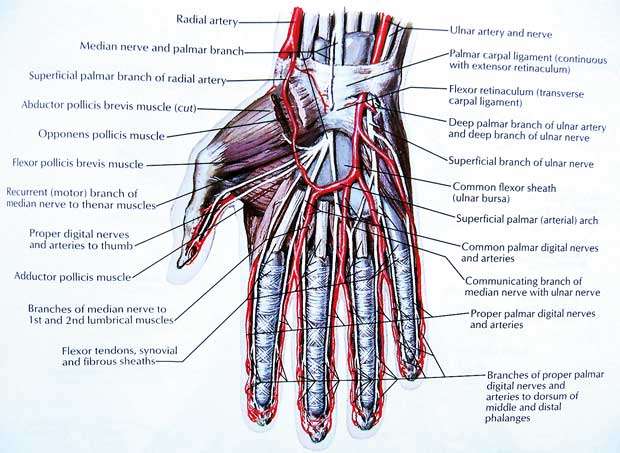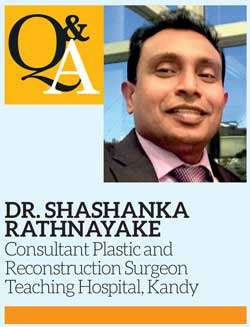21 Dec 2018 - {{hitsCtrl.values.hits}}

 Dr. Shashanka Rathnayake, Consultant Plastic and Reconstruction Surgeon attached to the Teaching Hospital, Kandy answers questions regarding hand fractures and how a plastic surgeon would handle such injuries.
Dr. Shashanka Rathnayake, Consultant Plastic and Reconstruction Surgeon attached to the Teaching Hospital, Kandy answers questions regarding hand fractures and how a plastic surgeon would handle such injuries.
Excerpts:
Q How can somebody suffer a hand fracture?
There are several reasons for a hand fracture. The commonest reason is a fall on ground and landing on the hand or the fingers. In addition fractures do occur when a motor vehicle is involved in an accident. There can be a crush injury due to various mechanical appliances in industrial and domestic use. Often these hand fractures are neglected or not attended to.
Q What are the problems a patient is going to face when experiencing a hand fracture?
A hand fracture is not deadly and will not progress to a cancer or a deadly disease. However, it will affect the function of the hand. If the injury is in the dominant hand the loss of function may affect the patient’s life significantly.The loss of hand function is due to two reasons. One is the fracture causing deformity. The other reason is the inappropriate treatment leading to stiffness and loss of function. Therefore one has to be aware that hand fractures can make you miserable if not treated properly.
Q How urgent is it to attend to a fractures in the hand? 
The fractures in the hand could be open or closed. An open fracture means there is a wound associated with the fracture and there is very high chance of bone infection. So those cases demand urgent attendance. The patient needs to be taken to an operating theatre for a wound wash out. Once the wound is attended to, the fixation of the fracture may not be urgent. It should be done properly. Repeated surgery or manipulations would lead to problems associated with wounds and poor healing of the fracture.
It is alright to attended to closed fractures or fractures without a wound after a couple of days. But the delay should not be lengthy as for a few weeks.
Q Do all fractures in the hand need surgical intervention?
Not at all. Some of the un-displaced fractures can be managed without surgical intervention and only with splinting. When the fractures are displaced and angulated they should be attended to surgically and fixed to prevent deformity. The same applies with non healing of fractures.The surgical fixation of the hand fractures could be again done without making surgical incisions or without opening the fracture site and under x ray guidance during surgery. The other option is to open the fracture and then go for a fixation of the fracture.
The fixation of the fracture can be done with wires, screws and plates.
Q What is the best way of managing a fracture?
The management plan of the fracture would depend on the extent of the damage. The fractures are going to heal spontaneously and in Western Medicine we do not prescribe any magic drug or local application which would expedite the healing process.The surgical intervention is to keep the fracture ends aligned and support the natural process of healing. Most of the fractures are going to heal if they are immobilised for an adequate period of time. However, if the immobilisation is too long, the hand may become totally stiff and may not function although the fracture is perfectly healed. Therefore the management should balance the bone healing and stiffening of the hand joints.
If the fracture can be rigidly fixed with screws and plates, the hand can be mobilised from the following day after surgery. Then the chance of hand becoming stiff is less. However, this way of managing fractures is costly and may not be available in many hospitals.
If the fracture is fixed semi rigidly with wires only, the mobilisation would be restricteda for sometime and the chances of the hand getting stiff is high.
Q Are you telling that using screws and plates for hand fractures is better always?
I cannot say that and in fact, there are fractures which cannot be fixed with screws and plates and also the use of screws and plates may cause wound complications. The main problem with plating is the tendons getting adhered to the plate and restricting mobilisation. When the fixation occurs with screws only the problems are less. But we cannot do that with all fractures. However, the use of plates and screws produces better results although it is costly.
Q How long does a fractured hand take to heal ?
Usually a hand fracture will be adequately healed and ready for mobilisation after 6 weeks. Anyway this does not mean that the hand can be used for heavy manual work after six weeks. One should not use the hand for heavy manual work for 10 to 12 weeks. It is always better to get advice from a hand surgeon before proceeding to normal work and if not a recurrence of the fracture would ensure the patient a miserable outcome.
Q What would you do if a fracture does not heal properly?
The improper healing could be non healing or can be termed healing with a deformity. The non union during a fracture has to be explored and fixed with screws and plates with bone grafting.The deformed bone can be given the right shape with various surgical techniques and the fixation with screws and plates. These surgical procedure are technically demanding and could be done by a properly trained hand surgeon.
Q How can the fractured hand be protected till it heals?
Traditionally, the hand fractures were immobilised with a protective plaster of paris splint. The problem with this plaster of paris splint is that it cannot be removed for washing the hand and it becomes very smelly after sometime. Therefore we use a plastic splint which can be removed and put back securely without jeopardizing the fracture. These splints should be made under the instructions of a hand surgeon. In the Teaching Hospital of Kandy we have trained therapists to do this kind of work maintaining international standards.
Q What is the role of a plastic surgeon during the management of a hand fracture?
Traditionally, all the fractures were managed by indigenous physicians and no surgical intervention was described in Ayurvedic medicine. However, the common belief is that almost all these can be managed by Ayurvedic physicians. It is an unfortunate situation where most of the hand fractures are mismanaged and end up in deformity.
Then the other belief is orthopaedic surgeons could manage all the fractures. Obviously skull fractures are fixed by neurosurgeons and facial fractures are fixed by oral surgeons and plastic surgeons. Like wise in the developed world hand fractures are managed by plastic surgeons who have a special training in hand fracture management. In addition the hand fracture could be associated with damage to the other structures of the hand.
Since the injury to structures like tendons or nerves should be ideally handled by a plastic surgeon, it is always better for the patient to get the plastic surgeon to handle a hand fracture.In addition some of these fractures may be associated with some soft tissue loss and need a reconstructive procedure to cover the defect which could only be performed by a plastic surgeon. If somebody has read the series of articles published on hand surgery it would be more clearly understood.
Q Are these plates and screws used in hand fractures harmful to the body or should they be removed after sometime?
This is again a misnomer. Leaving a plate and screws is not going to cause any harmful effect. Anyway if someone is worried we encourage removal after six months of surgery. However if the plate is causing problems like pain and tendon adhesions, it may be removed earlier; like in less than 6 months. When we use screws only for fixation, they do not cause any issue and can be left alone.
22 Dec 2024 57 minute ago
22 Dec 2024 1 hours ago
22 Dec 2024 1 hours ago
22 Dec 2024 6 hours ago
22 Dec 2024 8 hours ago